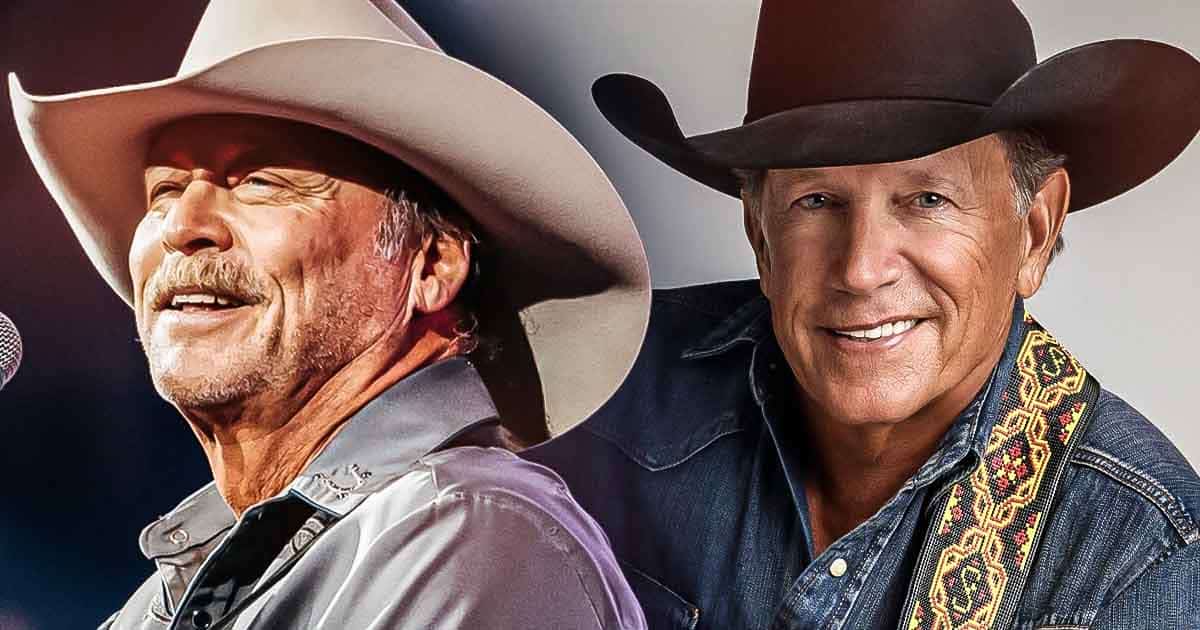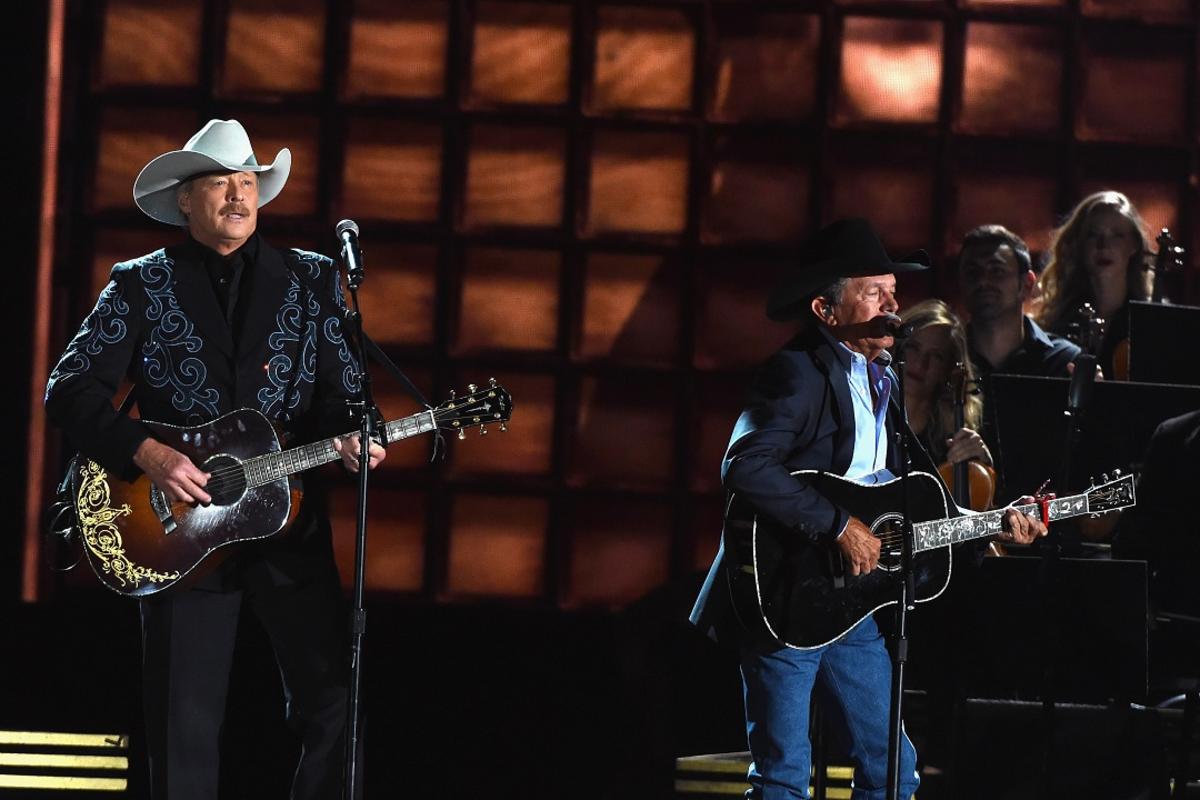The Night the Opry Touched Heaven: George Strait and the Legends Who Carried a Brother Home

On a night unlike any other, Nashville itself seemed to pause. The neon lights of Broadway flickered softer, and the hum of honky-tonks grew quiet, as if the city knew that history was unfolding a few miles away. Inside the Grand Ole Opry, more than 3,000 fans filled the pew-like seats, their hearts heavy with sorrow but ready to witness something sacred. They did not come for a concert; they came for a farewell.
It was the night the Opry touched heaven. And at the center of it stood George Strait — the King of Country — carrying not just a song, but a brother’s memory.
A STAGE TRANSFORMED INTO HEAVEN

From the first note, it was clear this was not Nashville as usual. The Opry stage, so often lit with laughter and energy, was cloaked in reverence. The curtain rose, not to a roar of applause, but to a hush that felt like a prayer.
George Strait walked forward, steady as ever, his Stetson tilted, his guitar gleaming under the lights. His voice, deep and timeless, cut through the silence like a psalm. It was not performance — it was invocation. Every word carried the weight of a man who had sung for millions but was now singing for one soul: a fellow brother in country music.
Behind him, the legends gathered. Alan Jackson bowed his head, his baritone low and broken, as if each line carried more grief than his throat could hold. Garth Brooks leaned into his guitar, strumming not for the crowd, but for the heavens, pouring out chords like confessions. Randy Travis, once silenced by illness, let his tears fall in place of words, his very presence a testimony to resilience. And Brooks & Dunn lifted their harmonies, voices braided together like a flame that refused to be extinguished.
TEARS THAT FELL LIKE NOTES

Carrie Underwood, sitting quietly in the front rows, was seen wiping her eyes. Younger artists, who had grown up idolizing the stage, sat still as stone. The audience, more than 3,000 strong, seemed frozen — not in shock, but in reverence. Not a cell phone glowed. Not a whisper carried. Only tears, silent and unashamed, slipped down faces both young and old.
Because they all knew. This was not a concert. This was a homecoming.
George Strait’s voice quivered on the final chorus, not because it faltered, but because it carried more than music. It carried memory, it carried brotherhood, it carried a truth too deep for words. And when the last note faded, there was no applause. Only silence — the kind of silence that says more than any cheer ever could.
A BROTHER CARRIED HOME
Those who were there will say that the Opry was not a stage that night — it was a chapel. It was not an arena of entertainment — it was a bridge between earth and heaven.
“George wasn’t just singing,” one fan said afterward, wiping her cheeks. “He was carrying someone. He was lifting a brother home.”
For decades, George Strait has been the unshakable pillar of country music, a man who never chased trends, never bent to fads, but let the songs speak for themselves. On this night, he did not carry a setlist or a show. He carried love. He carried legacy.
And he was not alone. The presence of Alan, Garth, Randy, and Brooks & Dunn gave the night a sense of unity that transcended careers, rivalries, or eras. They were not stars. They were brothers. And together, they gave wings to a soul leaving this world.
A MIRACLE IN MUSIC
What makes a miracle? Sometimes it is the unexplainable. Sometimes it is simply the undeniable. On this night, the miracle was that music became more than music. It became a vessel.
The Grand Ole Opry has seen its share of history: the debuts of legends, the tearful retirements, the unforgettable collaborations. But those who were present say they had never seen it transformed like this.
The crowd of 3,000 did not leave talking about notes or setlists or even star power. They left whispering about spirit. About how, for one night, the distance between Nashville and heaven felt like a single verse. About how George Strait and his brothers didn’t just sing to Toby Keith — they sang him home.
THE KING WHO STILL REIGNS
For George Strait, this night added a new chapter to an already unparalleled legacy. He has sold more than 100 million records, scored 60 number-one hits, and performed for presidents and soldiers alike. But in many ways, what happened at the Opry may become one of the most enduring memories of his career.
Because it was not about charts or records or accolades. It was about love. It was about honor. It was about reminding the world that country music, at its heart, is not an industry — it is a family.
As the lights dimmed and the audience finally rose to their feet, no one shouted, no one cheered. They simply stood, tears still on their cheeks, as if to say thank you — not just to George Strait, but to the brotherhood of legends who gave them a miracle.
THE NIGHT THE OPRY TOUCHED HEAVEN
Nashville will buzz again. The honky-tonks will blare, the tourists will sing along to jukeboxes, and life will return to its usual rhythm. But for those who were in the Grand Ole Opry that night, the memory will never fade.
They saw Dolly tremble, Reba cry, Garth strum, Alan bow, Randy weep, and George Strait sing a song that seemed to carry eternity itself.
They saw country music do the impossible.
They saw a night when the Opry touched heaven.
And they saw George Strait — not just as the King of Country, but as a brother who carried another home on wings of song.
